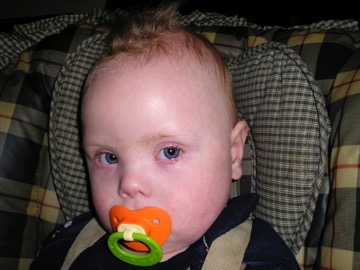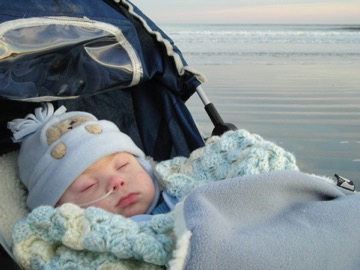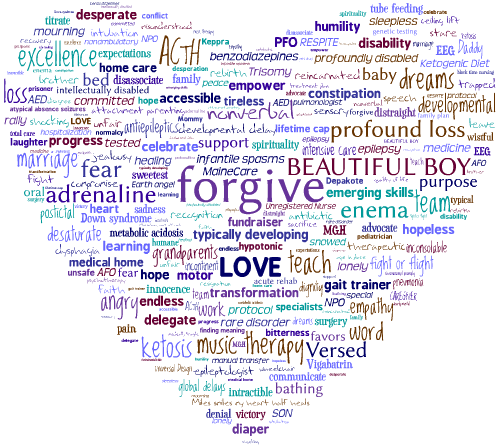Miles Smiles (My Heart Half Heals)
Mothering a severely disabled child with love
The second diagnosis
I’ll never forget that week as long as I live.
It was 6 a.m. on a Thursday morning in early June. I was up early to groggily nurse Baby Miles in the living room rocker. He was now almost five months old, feeding peacefully as he had since the day he was born.
This breastfeeding routine was, nonetheless, an extraordinary accomplishment. Miles had been diagnosed with Down syndrome when he was five weeks old. 
My husband Stephen and I were still in shock about this unheard-of late postnatal diagnosis. We could barely process the idea that our perfectly healthy baby’s future now lay in the balance. We were triaging deep emotional wounds about our baby’s entire being.
That Thursday morning, with the now-familiar dull buzz of grief in the background, I was feeding my baby boy and claiming those rare moments of normalcy between a mother and her infant. But in that dark dawn, I saw something in his tiny face that made my stomach churn.
Miles’ eyes darted laterally, left to right. A minute later, they did it again, left to right. It looked robotic, and I was instantly alarmed. Left to right. My sweet baby wasn’t trying to move his eyes like that, I was sure of it. It was involuntary. Left to right they zoomed again, in a sickening way.
All of our dreams for our Miles, our firstborn son, had already been largely stolen away from us when we received that bungled, delayed Down syndrome diagnosis. And now something very wrong was happening to him in my arms.
Every time I nursed Miles, after that morning, his eyes would dart. They moved insistently, now in clusters. It had to be neurological, I thought. The air hung thick with questions whose answers I didn’t think I had any more bravery to face.
Three days after the eye deviations had begun, on a Sunday, I had seen dozens and dozens of them–too many to count anymore. The episodes were increasing, and no longer limited to breastfeeding time.
Dear friends of ours had driven up for a planned visit that morning. I tried to keep my composure, but Miles’ clustering eye movements were too much. In a tearful panic, Stephen and I decided that he had to be brought to Boston Children’s Hospital immediately that day. We were bringing Miles to the Emergency Department because we were scared for him.
We gratefully called in a favor to a connected family member, who alerted the hospital’s ED that we were coming. They were ready for us when we arrived, and praised us for capturing some of the episodes on video. Seizures were mentioned, although that didn’t make sense to us.
Miles was admitted, and we spent that day having him tested and scanned and talking to doctors and staff. We knew that something big and terrifying was having its way with our baby.
The next morning, one of the hospital fellows came in to talk to us. Many things were discussed in those hours that we stayed there with Miles, but here’s what I remember. The fellow came into Miles’ hospital room in the morning, and closed the door. She offered us a seat, and she sat down in the rocking chair.
“The episodes are seizures. Miles has what’s called infantile spasms,” she said with, with true melancholy in her voice. “I am so sorry.”
We had no idea what that diagnosis meant. We did know that having a doctor-in-training give you their condolences was cause for alarm. The unfolding reality of our baby’s issues was throwing our three lives into total darkness.
We had zero information about infantile spasms. Our only computer was at home. There were no smartphones yet for Googling. In our protracted state of shock about our lives, we didn’t think to ask about a hospital computer lab or a library.
Stephen drove the 70 miles back to our house that night, to research infantile spasms online. The information that he brought back the next morning confirmed our fears. Quickly we learned that IS is the most difficult pediatric neurological condition that exists. It is a rare disorder, with huge variability of outcome. It is called Catastrophic Epilepsy of Childhood for good reason. You must fight for total seizure control to avoid the worst outcome: severe regression and intellectual disability (the more evolved term for “mental retardation”).
Our child had just been handed some kind of medical life sentence. We needed to go home and hide, snuggle him close and somehow make him well. We needed to start over with the joyful storyline that is written for happy, good people when they start a family.
Instead, we were kept at the hospital, still reeling, to start Miles on a high-dose steroid treatment the next morning. We were only somewhat warned for how awful the “gold-standard” ACTH would be. We were fighting this nightmare diagnosis with a nightmare drug.
The stakes could not have been higher. We were in the fight of our lives, against the clock, to save our baby’s future.
Miles was discharged a day or two later after being initiated on the powerful steroid at Children’s. We had to be taught how to give his painful daily intra-muscular shots at home for the next eight weeks. I was never able to bring myself to do it. Stephen bravely stuck our baby in the thigh early each morning before leaving for work. Like clockwork, I would then take Miles in my arms and soothe his crying from the injection, and my own guilt from what we were doing.
It had only been one week since I had first seen Baby Miles’ eye deviations in the early-morning darkness. In the coming weeks back at home, our baby was wracked with over 100 brief-but-damaging seizures a day. He was barely present, both from being checked out while seizing, and also from the harm that each one inflicted.
I was in tearful flight-or-flight mode all the time–exhausted from the grief, but unwilling to accept this situation for our son. In my mother mind, acceptance of our son’s health issues meant giving up. I honored my son by fighting the diagnoses with my whole being.
Through our unending heartache and desperation, we gave our hearts over to our sweet baby in every moment. Every day we witnessed his tiny body and mind getting beaten up by clusters of small but developmentally devastating seizures. Every day we gave him drugs to try to stop a kind of seizures that are generally unstoppable. 
Every day we fought with everything we had: the dedication and knowledge of the best pediatric epilepsy sub-specialists, the newest and most effective anti-seizure meds, the best attitudes, the most resolve.
Miles’ epilepsy team amazingly never gave up on him, when other professionals would have.
We as his parents never, ever, ever gave up on him, even when our shared lives had become ugly from his illness, and even a bit hopeless.
We fought with everything we had. It was years of intense fighting for our child. With his doctors, we fought hard, and we fought smart, and we had some critical treatment success.
The infantile spasms stole him away from us anyhow. They took away his ability to do just about everything. They stole his ability to eat by mouth, his chance to learn to walk or talk. They stole even his ability to smile. They stole our hope for our baby, and our dreams for our son.
So my husband and I have done the only things that we can do in the face of our young son’s developmental devastation.
We provide Miles with the very best total care at home, and at world-class medical facilities. We shower Miles with everlasting love and acceptance. We smother him every day with cozy cuddles, hugs and kisses, songs and smiles and touch and talk.
 We hope with all our hearts for miracles for him. And we’ve seen a few, including the return of his radiant smiles. But, whatever he can or cannot do, first and foremost is our unwavering love for this boy and his beautiful spirit. He needs us completely, but we need him more. The world needs him.
We hope with all our hearts for miracles for him. And we’ve seen a few, including the return of his radiant smiles. But, whatever he can or cannot do, first and foremost is our unwavering love for this boy and his beautiful spirit. He needs us completely, but we need him more. The world needs him.
We make it our life’s mission to find the son that we lost as a baby, and to tenderly help bring back whatever parts of him that we can.

